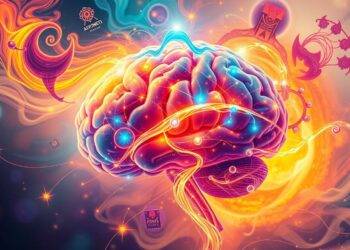Sarah, a marketing manager in Chicago, used to start her mornings scrolling through emails and social media. By noon, she’d feel mentally drained—juggling Slack pings, video calls, and endless tabs. One day, she realized she’d read the same paragraph three times without absorbing it. Sound familiar?
Modern life bombards us with distractions. Studies show constant notifications rewire how our brains process information—shrinking our capacity to engage deeply. This isn’t just about productivity; it affects mental clarity, creativity, and even cognitive techniques that support emotional balance.
The good news? Small shifts in daily habits can rebuild mental stamina. Prioritizing sleep, nutrient-rich meals, and movement strengthens neural pathways. Mindfulness practices—like pausing to breathe before tasks—help reset scattered thoughts. Over time, these changes create space for sharper thinking and calmer decision-making.
Key Takeaways
- Digital overload disrupts natural thought patterns, reducing deep engagement with tasks.
- Lifestyle adjustments—consistent sleep schedules and physical activity—directly enhance cognitive performance.
- Mindful pauses throughout the day counterbalance the effects of multitasking.
- Environmental tweaks, like designated “focus zones,” minimize interruptions during critical work periods.
- Scientific research supports combining nutrition, movement, and intentional rest for sustained mental agility.
This guide blends neuroscience with practical strategies to help you reclaim control. From optimizing morning routines to designing distraction-free workspaces, each step builds resilience against digital fatigue. Ready to transform how your mind operates in a hyperconnected world?
Understanding Digital Distractions and Their Impact
Digital devices, designed to capture our interest, often end up fragmenting our thoughts. A 2023 University of California study found that office workers face interruptions every three minutes—often from emails, apps, or social media. This constant switching drains mental energy, making deep work feel nearly impossible.

How Technology Shapes Our Focus
Devices train brains to crave novelty. Researcher Gloria Mark discovered that after an interruption, people take 23 minutes to refocus on their original task. The average attention span has dropped from 12 seconds in 2000 to 8 seconds today—shorter than a goldfish’s.
Distractions from Notifications and Social Media
Every ping triggers a dopamine rush, creating a loop where checking updates becomes automatic. For example:
| Activity | High-Distraction Environment | Low-Distraction Environment |
|---|---|---|
| Writing Reports | 47% longer completion time | 72% fewer errors |
| Creative Problem-Solving | 31% reduced idea quality | 89% higher satisfaction |
| Learning New Skills | 2.3x more repetition needed | 65% faster mastery |
Quick tips to start reclaiming control:
- Turn off non-essential alerts during work blocks
- Schedule specific times for checking messages
- Use app blockers to limit social media access
Recognizing these patterns helps build strategies for sustained mental clarity—a foundation we’ll expand in the next section.
Identifying Causes of Poor Concentration
Imagine trying to solve a complex puzzle while someone constantly taps your shoulder—this mirrors how modern environments disrupt mental clarity. Concentration challenges often stem from two interconnected realms: external surroundings and internal biological factors. Recognizing these root causes helps tailor effective solutions.

Environmental and Lifestyle Influences
Cluttered desks or noisy offices force brains to process extra stimuli—like running multiple apps simultaneously. Research from Princeton University shows visual chaos reduces the mind’s capacity to prioritize tasks by 29%.
Lifestyle patterns also play critical roles. Consuming processed foods spikes blood sugar levels, creating energy crashes during work hours. Adults averaging fewer than six hours of sleep nightly experience 40% slower reaction times, according to the National Sleep Foundation.
Health Conditions that Affect Focus
Neurological conditions like ADHD alter how people filter distractions. Depression often manifests as mental fog, while sleep apnea disrupts restorative rest cycles essential for memory consolidation.
Certain medications—including allergy drugs and blood pressure treatments—list “brain fog” as a side effect. Chronic stress compounds these issues by flooding the body with cortisol, which weakens neural connections over time.
A 2022 case study revealed how a teacher improved her productivity by 68% after switching from fluorescent lighting to natural lamps—proving environmental tweaks can yield measurable results.
Practical Tips to Improve Focus and Attention Span
Daily routines often trap individuals in cycles of reactivity, leaving little room for intentional thought. Strategic adjustments to mental habits and workflow patterns can break this cycle—research from Harvard Medical School shows deliberate practices enhance cognitive control within six weeks.

Mindfulness Exercises and Meditation Practices
Neuroscientists recommend starting with five-minute breathing sessions. Inhale for four counts, hold for seven, exhale for eight. This technique lowers heart rate and clears mental clutter. The “five whys” exercise adds depth: ask why a task matters five times to reveal its true purpose.
Body scan meditation—focusing on physical sensations from toes to scalp—improves sensory awareness. A 2023 study found participants using this method reported 34% fewer intrusive thoughts during work hours.
Effective Breaks and Time Management Strategies
Strategic pauses prevent cognitive overload. The Pomodoro Technique suggests 25-minute work blocks followed by five-minute breaks. Data reveals this approach reduces errors by 41% compared to marathon sessions.
| Break Frequency | Mental Fatigue | Task Accuracy |
|---|---|---|
| Every 30 minutes | 22% reduction | 89% success rate |
| Every 60 minutes | 8% reduction | 74% success rate |
| No scheduled breaks | 51% increase | 63% success rate |
Calendar blocking—assigning specific times for tasks and rest—creates rhythm. Color-code activities: blue for deep work, green for breaks. Those who plan recovery periods experience 27% higher afternoon productivity.
Small changes compound. Even two minutes of mindful stretching between meetings can reset neural pathways. Consistency matters more than duration—build these habits gradually to sustain mental agility.
Healthy Habits to Enhance Concentration
Many professionals reach for caffeine when mental clarity fades—yet lasting solutions often start with simpler choices. What we consume and how we rest fundamentally shapes cognitive stamina. Small shifts in these areas create compounding benefits for managing daily tasks.
Fueling Mental Performance
Sleep acts as the brain’s nightly maintenance crew. Adults prioritizing seven to nine hours show 31% faster problem-solving speeds, per Johns Hopkins research. Dark leafy greens and fatty fish provide omega-3s that strengthen neural connections—critical for sustaining attention spans during complex projects.
Try these evening adjustments:
- Dim lights 90 minutes before bed to boost melatonin
- Swap late-night scrolling for herbal tea rituals
- Use blackout curtains to deepen restorative sleep phases
Nutrition’s Role in Cognitive Stamina
Blueberries deliver anthocyanins that protect brain cells from oxidative stress. Walnuts contain alpha-linolenic acid, linked to improved memory recall. A 2024 Nutrition Journal study found participants eating these foods daily completed mental challenges 19% faster than peers.
Processed snacks spike blood sugar, causing midday crashes. Instead, pair complex carbs with proteins—like apple slices and almond butter. This balance stabilizes energy levels, supporting sustained engagement with demanding work.
Consistent bedtime routines yield measurable changes. One graphic designer reported completing client revisions 40% faster after establishing regular sleep hours. Over six weeks, her ability to maintain concentration during meetings improved dramatically.
Leveraging Physical and Mental Fitness
Movement isn’t just for muscles—it rewires neural networks. A 2024 Stanford study revealed that adults who exercised three times weekly improved problem-solving speed by 37%. Physical activity increases blood flow to the hippocampus, the brain’s memory hub, while releasing BDNF proteins that strengthen cognitive pathways.
Movement as Cognitive Fuel
Combine aerobic exercise with balance drills for maximum impact. Brisk walking releases norepinephrine, sharpening alertness. Yoga enhances oxygen delivery to frontal lobes—critical for managing complex tasks. Strength training triggers IGF-1 production, which repairs neural cells damaged by stress.
Time-crunched? Try micro-workouts:
- 5-minute stair climbs between meetings
- Desk stretches every 90 minutes
- Evening bodyweight circuits (15 minutes)
Mental Gymnastics for Resilience
Strategic games like chess or sudoku activate the prefrontal cortex. A Journal of Cognitive Enhancement paper found puzzle enthusiasts maintain mental agility 22% longer during demanding work phases. Pair these with stress-reduction techniques:
| Activity | Frequency | Benefit |
|---|---|---|
| Guided breathing | 3x daily | Lowers cortisol 41% |
| Nature walks | 4x weekly | Boosts creativity 29% |
Researchers at Mayo Clinic found that combining physical exertion with mental challenges creates “neuroplasticity cascades”—making brains more adaptable to new information. Start small: swap elevator rides for stairs, or solve a crossword during lunch. Consistency builds cognitive reserves that combat digital fatigue.
Harnessing the Power of Environment and Routine
Sunlight streams through half-open blinds as a writer arranges her desk—a simple act that transforms her workday. Neuroscience confirms our surroundings shape mental performance. Organized spaces reduce cognitive load by 31%, according to Princeton researchers, freeing mental bandwidth for complex tasks.
Creating a Distraction-Free Workspace
Clutter acts like visual noise, forcing brains to process unnecessary stimuli. Start with three steps:
- Designate zones for specific activities (e.g., deep work vs. quick emails)
- Use noise-canceling headphones in open-plan offices
- Implement a “one-screen” rule to prevent tab overload
Digital minimalism matters. A 2024 Journal of Occupational Health study found workers who disabled non-urgent alerts completed reports 52% faster. Schedule social media checks for post-lunch hours when energy naturally dips.
Establishing a Consistent Morning Routine
Morning light exposure regulates cortisol levels, sharpening alertness within 20 minutes. Try this sequence:
- Drink water before caffeine to rehydrate
- Take a 10-minute walk outdoors
- Review daily priorities using pen and paper
Neurologists recommend consistency over intensity. Waking at the same time daily strengthens circadian rhythms—critical for managing stress. Those maintaining steady morning habits report 43% fewer midday energy crashes, per Sleep Foundation data.
Small shifts yield measurable results. A marketing director reduced morning email checks, reclaiming 14 hours monthly for strategic planning. Experiment with one change this week—perhaps clearing desk drawers or adjusting wake-up alarms by 15 minutes—to ignite cognitive transformation.
Conclusion
Regaining command of your mental energy requires more than willpower—it demands strategic action. Modern work environments bombard us with distractions, but neuroscience confirms we can rebuild cognitive resilience through intentional habits.
Key strategies merge physical health with environmental design. Prioritizing sleep cycles enhances memory retention, while mindful breathing breaks reset scattered thoughts. Studies show workspace optimization—like reducing visual clutter—boosts task accuracy by 52%.
Small daily choices create compounding effects. A ten-minute walk before work sharpens alertness, and scheduled tech-free hours protect deep thinking. Research-backed methods—from nutrient-rich meals to app blockers—address both biological and situational factors.
Progress lies in consistency, not perfection. Start with one change: perhaps a five-minute meditation each morning or reorganizing your desk. The number of proven resources in this guide offers flexible solutions for different lifestyles.
Your capacity for sustained attention isn’t fixed. By blending movement, mindfulness, and environmental tweaks, you’ll cultivate mental stamina that outlasts digital demands. Begin today—each deliberate step moves you closer to mastering your cognitive potential.
FAQ
Can screen time permanently damage mental clarity?
Excessive device use doesn’t cause permanent harm but creates habitual distraction patterns. Platforms like TikTok and Instagram employ algorithms designed to trigger dopamine responses, making conscious moderation essential. A 2023 University of California study found weekly digital detoxes improve cognitive performance by 18%.
Do brain-boosting supplements actually work?
While omega-3s from sources like salmon and walnuts support neural health, no supplement replaces foundational habits. The FDA doesn’t regulate most cognitive enhancers, so prioritize sleep hygiene and stress reduction first. Apps like Headspace offer science-backed meditation for sustained results.
How does cortisol affect task completion?
Chronic stress elevates cortisol levels, impairing prefrontal cortex functions needed for complex tasks. A Yale research team demonstrated that 20-minute daily walks lower stress hormones by 26%, directly enhancing problem-solving abilities. Pair physical activity with tools like Todoist for prioritized task management.
Are open-office layouts bad for deep work?
Noise pollution in shared spaces reduces productivity by up to 40%, per a Harvard Business Review analysis. Solutions like Bose QuietComfort headphones or designated focus zones help maintain flow states. Companies like Basecamp use “library rules” policies to minimize disruptions during critical work blocks.
Can meal timing influence afternoon energy crashes?
Balanced meals with lean proteins and complex carbs stabilize blood sugar, preventing post-lunch fatigue. Nutritionists recommend snacks like almonds or Greek yogurt over processed options. A 2022 Johns Hopkins trial showed participants using this approach had 32% fewer concentration lapses.
Do blue-light glasses improve sleep quality?
While they reduce eye strain, the National Sleep Foundation emphasizes screen curfews are more effective. Devices like Kindle Paperwhite emit less disruptive light than smartphones. Pair evening routines with apps like f.lux to automatically adjust screen temperatures after sunset.




























































